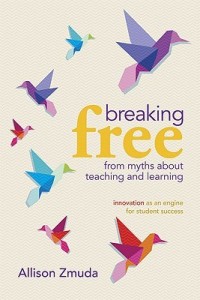
Teaching kids how to cope with mistakes and failure is one of the toughest (and most important) aspects of our jobs as educators. Most of our schools are set up in a way that values a limited number of intelligences, so students who aren’t naturally successful in the traditional areas and core academic subjects often feel frustrated and dumb. The way that schools define failure and success by test scores only compounds the problem. Many children are terrified of taking risks, and view failure as the worst thing that can happen to them. They want to play it safe, fly under the radar, and just get by.
So what do we do about these issues? I’ve invited Allison Zmudato answer some questions on this topic for us. She’s the author of a powerful new book called Breaking Free from Myths About Teaching and Learning: Innovation as an Engine for Student Success. In it, she shares some revolutionary ideas that individual teachers can use to transform the way they educate students despite dysfunctional school systems. Allison clearly understands the stressful situations that teachers face and makes a solid connection between the way we teach and the level of enjoyment we get from it.
One of the things I really love about this book is that after Allison uncovers the root of the problem, she has a section called “Moving to Action.” This section explains not only what schools and school systems can do, but specifically outlines what ONE teacher can do. I find this incredibly empowering, because the implication is that every single educator can affect change. No matter how many problems there are in your school system, YOU can do something to help your students break free from myths about their learning.
I’ve asked Allison to participate in a video chat to answer a few questions with the “one teacher” approach in mind. Her answers below apply to every single one us. No matter how dysfunctional your school or school system is, you CAN make a difference for students, and help them understand and value the journey to success even when they encounter setbacks.
Here are the questions Allison answers in the video above (click here if you can’t see the video):
- What prompted you to write “Breaking Free”?
- One of the myths you talk about is “I feel proud of myself only when I get a good grade.” I’ve seen so many kids who get down on themselves when they get bad grades. What are some practical steps we can take to show kids that we value each level of their progress, and help them understand that improvement is valuable?
- The fourth myth you mention in your book is “If I make a mistake, my job is only to replace it with the right answer.” What can we as teachers do to wean students off their dependency on us to tell them what their mistakes are?
- Many students see failure as the absolute worst thing that can happen to them. You address this with myth #7: “If I get too far behind, I will never catch up.” What can we do to help these students persevere?
- Is there any final thought you want to leave with teachers who are struggling to keep their students motivated and encouraged in a system that is not designed to meet their needs? Anything else we can do to instill courage in kids so they are empowered to take risks as well as experience (and recover from) failure?
Want to win a copy of Allison Zmuda’s book courtesy of ASCD? Leave a comment below with your thoughts on helping kids see failure as part of the learning journey. The contest ends on Thursday, 6/21 at midnight EST.

UPDATED 6/22: Contest closed! The winner is #19, Adam. Thank you to everyone who took the time to leave a comment. I (and obviously many others) enjoyed reading how you grapple with this topic in your own classroom. Wonderful stuff.

Angela Watson
Founder and Writer
Discussion
Leave a Reply
OR

Join our
community
of educators
If you are a teacher who is interested in contributing to the Truth for Teachers website, please click here for more information.
















WOW this book looks amazing. So great to teach kids they are more than just their grades
This is an issue I’ve been pondering how to address with my students. I would love to read the book!
Thank you for writing this!! Failure is a part of life and at times there are no second chances. We need to teach our children that when you are given a second chance, you need to take advantage of it, but when you are not given a second chance they need to learn to cope with the mistake, learn from it, and move on.
It seems each year brings more children that shut down if not sure, or upset if not perfect. Learning is ongoing…it’s okay to try and fail…we learn together. It’s a challenge to gain their trust to try, but oh the delight when they succeed, even when they think they can’t!
I’ve been teaching for 3 years and work with many students who are really below level, underchallenged, and many who have very-low expectations of themselves. To teach these students to develop the endurance of self-correction while maintaining self-esteem that they can improve (not just get the right anwer) is very difficult. I often found myself getting frustrated in class because I could see and sense their potential for huge improvement, but they weren’t budging! I plan on starting this upcoming year out a little differently with the tone – I want them to know that I expect them to work hard but to start off slow, picking up skills along the way but that they should have high expectations of themselves through this process.
Thanks for the ideas and refreshment!
Jessica